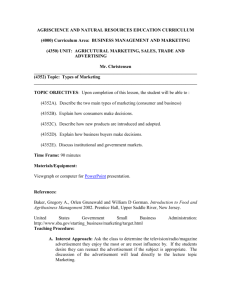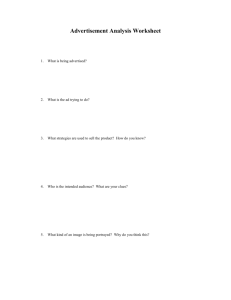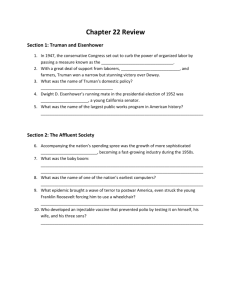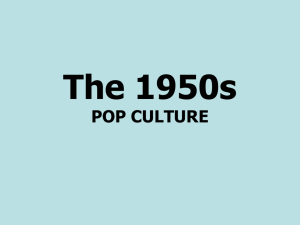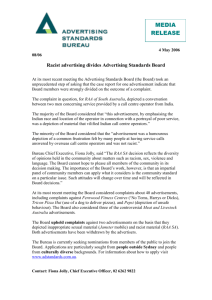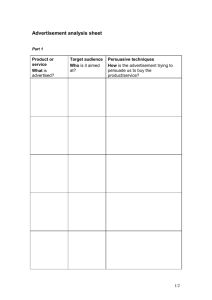Lesson Plan Introduction TAH Spring Semester 2012 Introduction
advertisement
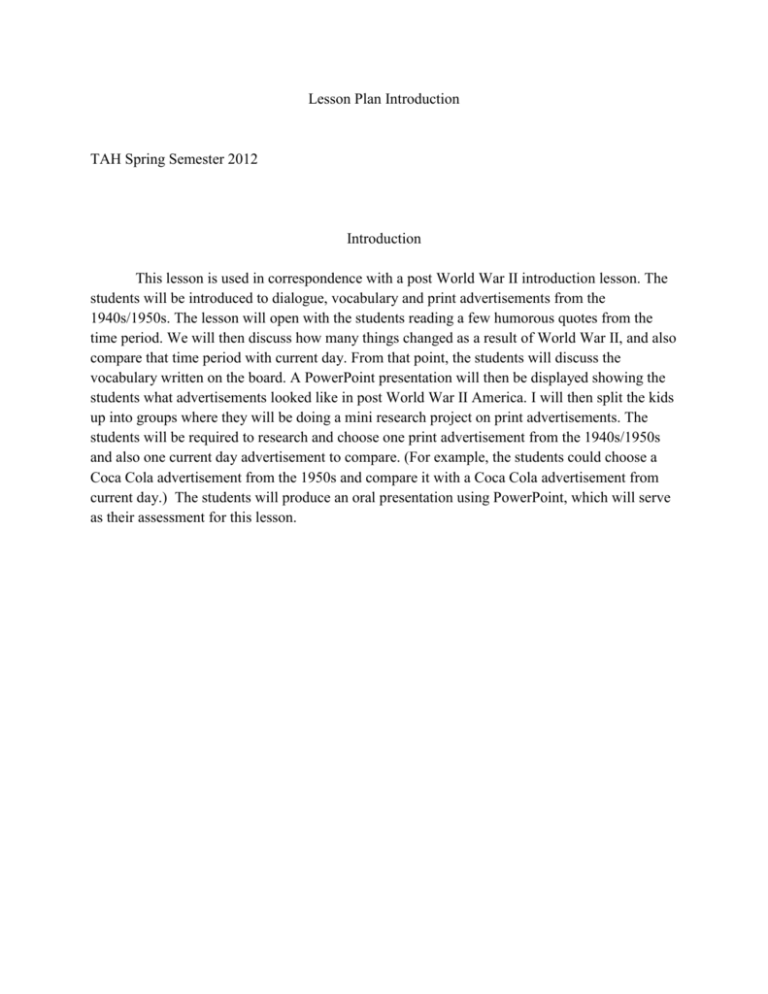
Lesson Plan Introduction TAH Spring Semester 2012 Introduction This lesson is used in correspondence with a post World War II introduction lesson. The students will be introduced to dialogue, vocabulary and print advertisements from the 1940s/1950s. The lesson will open with the students reading a few humorous quotes from the time period. We will then discuss how many things changed as a result of World War II, and also compare that time period with current day. From that point, the students will discuss the vocabulary written on the board. A PowerPoint presentation will then be displayed showing the students what advertisements looked like in post World War II America. I will then split the kids up into groups where they will be doing a mini research project on print advertisements. The students will be required to research and choose one print advertisement from the 1940s/1950s and also one current day advertisement to compare. (For example, the students could choose a Coca Cola advertisement from the 1950s and compare it with a Coca Cola advertisement from current day.) The students will produce an oral presentation using PowerPoint, which will serve as their assessment for this lesson. Lesson Plan # __1__ TAH Grant-Spring Semester 2012 Lesson Plan Title: Causes & Consequences of the Second World War Class periods projected to spend on plan: 1-3 (Allow 1 class period for presentations) Plan focus: Check on of the following: Primary sources Technology Reading like a Historian model Technology to be used: Computer with internet access Lesson Objectives Discuss the U.S. economy, society, and politics in the years following World War II. Explain the rise in advertising during this period by reviewing various print advertisements from the late 1940s and early 1950s. Research a print advertisement from current day and compare it to an advertisement from the 1940s/1950s CLE(s): United States History 3a.x Causes, comparisons, and results of major twentieth-century wars: Examine the wars of the twentieth-century pertinent to US history including: causes, comparisons, consequences and peace efforts United States History 3a.y Understanding cultural changes: Describe the changing character of American society and culture (i.e., arts and literature, education and philosophy, religion and values, and science and technology) Outline of lesson: (include all activities, teacher input, etc.) Begin the lesson by showing the class these various quotes on a powerpoint or a handout: “Go fetch my slippers and get me something to drink from the icebox. I’ll be sitting on the veranda with my feet up on the ottoman.” “But Dad, everyone is waiting for me in the vestibule. I want to play stickball and hang out on Jimmy’s stoop and listen to 45’s on his new Victrola.” Explain to the student’s that the 1940s and 1950s were very different from what they experience today as students. The dialogue was different, as well as the vocabulary used. After discussing these quotes write the following vocabulary words on the board: Cold War Vaccuum Cars Communism Arms Race Baby Boom Assembly Lines G.I. Bill Television Suburbs Segregation Labor Camps At this time discuss with the class how drastically the U.S. economy, society, and politics changed in the years following WWII. Discuss the above terms and have the students answer the following questions: 1. What does each of the terms communicate about post-war America in the late 1940s and early 1950s? 2. In what ways was this a time of prosperity and hope? 3. What were some challenges the nation faced? From this point we will begin discussing the role of advertising during this era and how advertising changed after WWII. We will also discuss why this was an exciting time for advertising in America. PowerPoint can be used to showcase several types of ads from the 1940s and 1950s. (see attached) After the students have a well rounded understanding of advertising in the 1940s/1950s. I will split them up into groups of 2-3. In the groups, the students will do a small research project where they will pick a particular advertisement from the discussed time period. The students will be creating a PowerPoint presentation comparing a particular product advertisement from the 1940s/1950s to the product’s current advertisement today. (For example, the students could use a Coca Cola print ad from the 1940s and compare that to a Coca Cola print ad from present day.) The PowerPoint should answer the following questions about their advertisements: 1. 2. 3. 4. What product is being advertised? Who is the target audience? How is the product described? What features are highlighted? What claims does the ad make? What does it promise the product will provide the buyer? (For example: comfort, excitement, popularity, beauty, praise, prestige?) 5. Does this ad use symbols or stereotypes to sell the product? If so, which ones? 6. Does this ad give any evidence or proof to support its claims? If so, what is it? 7. What other information is included in the ad? (For example, was the product's price included?) Was there any information you found interesting or surprising? 8. What does the ad indicate about the U.S. in the post-war years? 9. Do you think this ad would be effective for a similar product today? Why or why not? 10. How are the two advertisements similar? 11. How are they different? (For example, do they make similar claims for the buyer? Do they use different symbols or stereotypes to sell the product?) When all student presentations are completed, they will be presented to the class. Documents to be used: Please see attached. *A PowerPoint presentation with a preview of advertisements from 1940s/1950s is included. Others may be added if desired. Assessment for lesson: See attached rubric.
